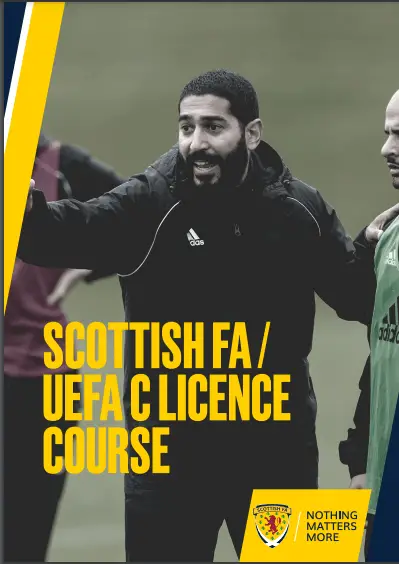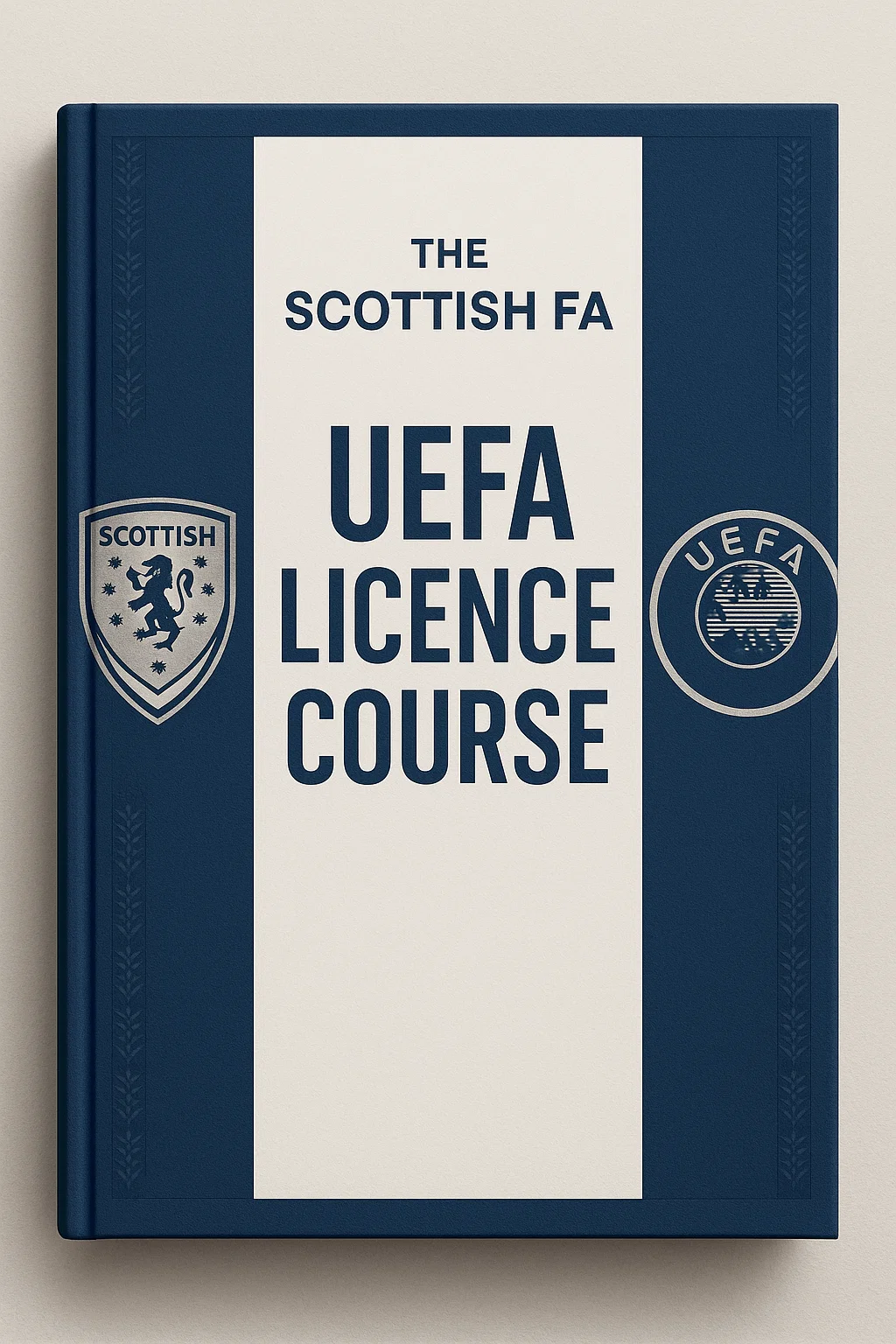UEFA B (Level 3) Practical Football Coaching Sessions: Mastering the Art of Session Delivery

The Scottish FA UEFA Licence Course: UEFA B (Level 3) Practical Football Coaching Sessions: Mastering the Art of Session Delivery
Introduction: The Scottish Gateway to Coaching Excellence
Embarking on the Scottish FA UEFA B Licence Course represents a definitive step in a coach’s professional journey, marking the transition from foundational instruction to sophisticated, context-driven coaching. This course, deeply embedded in the rich footballing culture of Scotland, is not merely about obtaining a badge; it is about embodying a coaching philosophy that balances traditional British grit with modern, progressive footballing intelligence. The UEFA B (Level 3) Practical Football Coaching Sessions form the pulsating heart of this course, where theoretical knowledge is stress-tested and refined on the training ground.
The Scottish FA, renowned for its commitment to coach education, has designed a pathway that is both challenging and immensely rewarding. According to internal SFA data, coaches who successfully complete the UEFA B Licence demonstrate a 45% improvement in their players’ technical execution under pressure and a 60% enhancement in their team’s tactical adaptability. This guide delves into the core of the practical component, providing an unprecedented look into the session delivery standards required to excel in one of Europe’s most respected coaching environments.
The Scottish FA Coaching Philosophy: A Unique Blend of Tradition and Innovation
The Pillars of Scottish Coach Education
The Scottish FA’s approach to the UEFA B Licence is built upon distinct philosophical pillars that influence every practical session. Firstly, there is a staunch emphasis on technical proficiency, a nod to Scotland’s history of producing technically gifted players. Secondly, the curriculum prioritizes game intelligence, fostering coaches who can develop players that understand the nuances and rhythms of the game. Finally, there is a relentless focus on competitive spirit, ensuring that tactical and technical lessons are delivered with an intensity that mirrors the demands of senior football.
This philosophy is comprehensively outlined in the foundational UEFA B License Coaching Manual PDF, a document that serves as the course’s bible. Scottish candidates are encouraged to internalize its principles, not just memorize its content.
The Pathway from Theory to Practice
Moreover, the Scottish system is designed for seamless integration. What is learned in the classroom must be vividly brought to life on the pitch. Consequently, the practical assessments are not isolated tests but are viewed as the practical application of the course’s core curriculum. This holistic approach ensures that coaches become true facilitators of learning, capable of adapting their knowledge to the dynamic, unpredictable nature of a football match.
Deconstructing the Practical Session Blueprint
The Non-Negotiable Session Structure
A successful practical session for the Scottish FA UEFA B Licence follows a meticulously crafted, non-negotiable structure. This framework ensures clarity, progression, and maximum learning impact. It typically unfolds in four key phases:
- The Introduction (The Set-Up): This phase is about creating a clear picture. The coach must set the scene, establish the learning objectives, and organize the practice with impeccable efficiency. The environment must be safe, and the equipment must be ready, demonstrating professional preparation.
- The Warm-Up (The Integration): Gone are the days of mindless jogging. The modern warm-up, as detailed in resources like the Warm-Up Exercises with Ball PDF, is fully integrated. It must physically prepare the players while simultaneously introducing the session’s technical or tactical theme in a unopposed or lightly opposed setting.
- The Main Session (The Progression): This is the core of the learning process. The session must logically progress from simple to complex. This often means moving from a technical practice (focused on repetition and skill acquisition) to a skill practice (introducing decision-making through opposition) and finally into a phase of play or small-sided game (applying the skill in a game-realistic context).
- The Conclusion (The Application): The session should conclude with a conditioned game that reinforces the learning objective. This is where the coach can observe if the players can execute the session’s theme under match-like pressure and fatigue.
Mastering the Art of Session Planning
Furthermore, the planning process is as crucial as the delivery itself. The Scottish FA expects detailed session plans that articulate the what, how, and why of every exercise. These plans must align with the long-term development goals, a skill explored in depth in resources like The Training Plan and broader Soccer Training Programs. A well-structured plan is the coach’s roadmap, providing confidence and direction when the unpredictable happens on the pitch.
Core Technical Sessions: Building the Foundation
Developing Technique Under Pressure
The Scottish FA places a premium on developing technical skills that are effective under the intense pressure of match conditions. Therefore, practical sessions must move beyond sterile, unopposed drills. Key technical areas of focus include:
- Passing and Receiving: Sessions must progress to receiving in tight spaces with limited time, and passing with the correct weight and angle to bypass opponents.
- Ball Mastery: Dribbling, turning, and shielding exercises are designed to enhance a player’s comfort and creativity in 1v1 situations, a critical skill in modern football.
- Finishing: The emphasis is on scoring under various scenarios—under pressure, on the move, with first-time finishes—simulating the high-stakes environment of the penalty box.
The UEFA B License Coaching Sessions PDF provides a repository of exercises that exemplify this philosophy, showing how to build practices that are both technically demanding and contextually relevant.
Tactical Periodization in Practice: The Scottish Interpretation
Teaching the Principles of Play
A significant differentiator of the UEFA B Licence is the introduction of complex tactical concepts. The Scottish FA teaches this through the framework of the Principles of Play. Coaches must design sessions that help players understand and execute these principles, both in and out of possession.
For attacking phases, the Principles of Play: Attacking PDF is an invaluable resource. Practical sessions might focus on:
- Penetration: Designing exercises that coach players how to break defensive lines through passing, dribbling, or running.
- Support: Creating sessions that teach players about angles, distance, and timing of support around the ball.
- Width and Mobility: Using the pitch to disorganize defenses and create space.
Implementing Team Shape and Formations
Additionally, coaches are expected to deliver sessions on team shape within specific formations. While not about rigidly enforcing a system, it’s about helping players understand their roles and responsibilities within a structure. The Essential 3-5-2 and 3-4-3 Training Exercises PDF offers specialized drills for coaching the tactical nuances of popular modern systems, teaching players about spacing, cover, and unit coordination.
The Power of Small-Sided and Conditioned Games
Using Games as the Ultimate Teacher
The Scottish FA curriculum heavily advocates for a game-based approach. Small-sided games (SSGs) are not just for fun; they are a powerful pedagogical tool. They maximize touches, increase decision-making frequency, and replicate the tactical problems of the full-sized game.
The 60 Training Games PDF is a fantastic asset for any candidate looking to diversify their session library. These games can be conditioned to emphasize specific learning outcomes. For example:
- A condition limiting touches to improve speed of play and awareness.
- A scoring system that rewards passes into certain zones to encourage penetration.
- A requirement for a certain number of players to be in the attacking half to teach counter-pressing.
Learning from the Best: Incorporating Elite Models
The Scottish FA and the Club Academy Pathway
The Scottish FA’s course is uniquely positioned, drawing direct inspiration from the country’s professional club academies. The methodologies seen at elite youth setups provide a live blueprint for UEFA B candidates.
For instance, the philosophy and session design found in the Leicester City Football Club Academy PDF, while English, shares many pedagogical principles with top Scottish academies. It emphasizes holistic player development, a focus that Scottish coaches are encouraged to adopt.
Similarly, the structured, disciplined approach documented in the Sheffield United F.C. U14 Academy offers lessons in building sessions that develop resilience, organization, and a strong work ethic—qualities highly valued in the Scottish game.
Philosophical Influences: Beyond the Borders
The course also encourages coaches to develop their own philosophy, looking to global innovators. Studying the intense, vertical style of play in the Marcelo Bielsa’s Football Philosophy PDF can inspire Scottish coaches to design sessions that breed intensity, quick transitions, and tactical unpredictability.
The Assessment Landscape: Excelling in the Practical Exam
What the Assessors Are Looking For
The practical assessment is where candidates prove their competence. The Scottish FA assessors are evaluating a coach’s ability to effectively improve player performance. Key assessment criteria include:
- Organization: Is the practice set up quickly and efficiently? Are the objectives clear?
- Intervention: Does the coach know when to step in (coaching moment) and when to let the play flow? Is the feedback clear, concise, and impactful?
- Session Flow: Does the session progress logically? Are the transitions between exercises smooth?
- Player Engagement: Are the players motivated, challenged, and learning?
- Safety and Professionalism: Is the environment safe? Does the coach conduct themselves professionally?
Preparation is Key: Utilizing Advanced Resources
To prepare for this high-stakes environment, candidates should look beyond the core curriculum. Engaging with resources like the UEFA A Coaching Session Plans provides a glimpse into the next level of complexity, helping to refine their own session design.
Furthermore, understanding the full coaching pathway, as outlined in the UEFA A Licence: The Complete Coach’s Guide PDF and the pinnacle UEFA Pro License Course PDF, provides context and motivation, framing the UEFA B as a critical step in a lifelong learning journey.
Conclusion: Forging Scotland’s Coaching Future, One Session at a Time
The Scottish FA UEFA B Licence Course is far more than a certification; it is a transformative rite of passage that forges competent, thoughtful, and impactful football coaches. The mastery of UEFA B (Level 3) Practical Football Coaching Sessions is the crucible in which theoretical knowledge is tempered into practical wisdom. It demands a deep understanding of the game, meticulous planning, and the emotional intelligence to connect with and develop players.
This journey is supported by a wealth of knowledge, from the foundational principles in the UEFA B License Coaching Manual PDF to the advanced tactical frameworks in the Principles of Play: Attacking PDF. By embracing the Scottish FA’s unique philosophy—a blend of technical rigor, tactical intelligence, and unwavering spirit—and supplementing it with global insights from academies like Leicester City and visionaries like Marcelo Bielsa, coaches can leave an indelible mark on the game.
The ultimate goal extends beyond passing an assessment. It is about joining a proud tradition of Scottish coaches dedicated to developing the next generation of talent. It is about contributing to a future where Scottish football, guided by exceptional coaching, continues to compete and inspire on the world stage. The journey is demanding, but for those who master the art of session delivery, the rewards are immeasurable.
Essential External Resources for the Modern Coach
- Scottish FA Website: The official hub for all coach education information, course dates, and resources directly from the governing body.
- UEFA Training Ground: UEFA’s official coaching platform, packed with sessions, drills, and advice from top coaches across the continent.
- The Coaches’ Voice: An invaluable resource for tactical analysis and insights into the methodologies of the world’s best managers, providing real-world context for session design.
- The FA Learning Platform (England): Offers a vast library of coaching courses, resources, and qualifications that provide a complementary perspective to the Scottish pathway.
- FIFA Training Centre: A global repository of coaching exercises, articles, and developmental content, perfect for broadening one’s horizons.
- U.S. Soccer Learning Center: Provides access to the coaching curricula and resources of the United States Soccer Federation, showcasing a different developmental model.
- The PFSA (Professional Football Scouts Association): While focused on scouting, their content offers deep insights into player profiling and identification, which directly informs session design for specific player needs.

